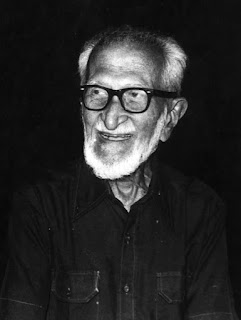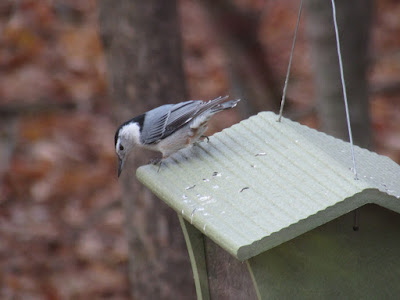On the Wing# 41: (BRO) Ali Vs. Lorenz
Merry Christmas to all and I have a piece of holiday cheer that's in the form of the next match up of the Babe Ruth of Ornithology! This weeks challengers are the father of Indian ornithology, Salim Ali and the king of imprinting Konrad Lorenz. Let's get ready to RUMBLE!!
Konrad Lorenz (1903-1989) is best remembered for his books on his studies of imprinting and other instinctive behaviors shared by birds and other animals. He is most famous for his work with imprinting in geese and as the photo shows above, he was very dedicated to his work. He along with another ornithological colleague called Nikolaas Tinbergen, studied the behavior of geese wild and domestic. This lead him to lament "…that an overpowering increase in the drives of feeding as well as of
copulation and a waning of more differentiated social instincts is
characteristic of very many domestic animals" and "…that analogous processes of deterioration may be at work with
civilized humanity." This unfortunate phrasing was brought up again in his associations with the Nazi Party, but details surrounding his support of their practice were most likely a reaction to his own survival as opposed to active support of their views. Despite this, his work as an ethologist won him a shared Nobel Peace Prize with Tinbergen and Karl von Frisch on the subject and helped to cement his importance in the scientific community. Later after he'd died, he became a popular figure among animal rights advocates due to his noninvasive research in the imprinting and other natural behaviors of geese. Another giant in science that deserves so much more attention, but I guess I've done my part to promote him, for what it's worth.
Score tabulation time!
Ali:
With that result, Konrad Lorenz goes on to face Florence Augusta Merriam Bailey in the quarter finals! Next weeks challengers are the dean of the birdwatchers, Ludlow Griscom vs. the bird painter extraordinaire John Gould! Have a lovely holiday week and as always, happy birding ^_^.
 |
| Rocking the thick rims since 20th century began. |
Salim Ali (1896-1987) is widely regarded as the father of modern Indian ornithology and is well respected in the the scientific communities of Asia and most the Old World. While less well known in the Americas, his work identifying species throughout his native India made him well known for rediscovering rare species. Most famous for his bird surveys, the man also saved and vouched for two national parks and the Bombay Natural History Society so that they could continue with conservation efforts for the whole country to enjoy. Ali started collecting birds as a child after being encouraged to start a collection by W.S. Millard, an English naturalist based in India. His inspiration was further spurred by Millard's assistance after identifying an unknown sparrow to Ali after he'd collected it. The bird later turned out to be a Yellow-throated Sparrow (Petronia xanthocollis)
He met with many famous ornithologists that he helped to cement his role in Indian ornithology and conservation. Richard Meinertzhagen, the famous ornithological cheat (whose thieving actions were recently brought to light thanks to the efforts of Pamela Rassmusen and her colleagues), remarked at Ali's enthusiasm for birds, but deplored his inability to cook, properly skin, or do many of the camp tasks that were asked of him during collection trips. Although Ali held strong views on hunting and killing for sport, he defended the needs of scientific collecting until his dying day, advocating the need for the specimen in hand, but also for to take detailed notes on the birds habits, habitat, and features. He also despised the complexities of taxonomy, a practice that in recent years, certainly has driven many a birder and ornithologist insane with with redrafts and reconfigurations that are made every single year. Overall, the man had many achievements that are sure to rival many a modern or past ornithologists credentials and experiences. He certainly was an impressive specimen and while he was a collector himself, in the world of ornithologists, he was certainly one of a kind.
 |
| They told him their secrets. They couldn't have asked for anything better. |
Score tabulation time!
Ali:
- Widely regarded as the father of Indian ornithology and integral to the conservation and preservation of the Bombay Natural History Society and several natural areas and parks. (1)
- Discovered the habitats and ranges of several little known and occasionally all new species of birds. (1)
- His association with many famous ornithologists cemented his importance in the history of the science. (1)
- Was inspired to become an ornithologist after the naturalist W. S. Millard assisted him with the identification of a Yellow-throated Sparrow he'd shot and collected (1)
- Espoused the importance of scientific collecting, but was anti sport hunting. Bit of a contradiction but I bet Coues would have love him. (-1)
- Despised the intricacies and difficulty of the taxonomy used to identify and categorize birds, stating that observation of the living bird was far more valuable than any efforts to categorize them (1/2)
- Fairly useless when it came to proper care of field specimens, camp upkeep, and basic needs such as cooking and care of equipment when out on collecting missions. (-1)
- Best remembered for his studies relating to imprinting and other instinctive behaviors in geese and other birds. (1)
- Shared a Nobel Piece Prize with Nikolass Tinbergen and Karl von Frisch in ethology (the study of animal behavior) in relation to their work with geese. (1)
- Joined the Nazi Party to gain a job as a university professor, but ultimately wasn't enamoured by their views and did it mainly out of survival in a time of war. (-1)
- Wrote many books on the subject of imprinting in geese and other animals. (1)
- Became a popular figure among animal rights advocates due to his noninvasive study techniques during his experiments involving both wild and domesticated geese. (1)
With that result, Konrad Lorenz goes on to face Florence Augusta Merriam Bailey in the quarter finals! Next weeks challengers are the dean of the birdwatchers, Ludlow Griscom vs. the bird painter extraordinaire John Gould! Have a lovely holiday week and as always, happy birding ^_^.


Comments
Post a Comment